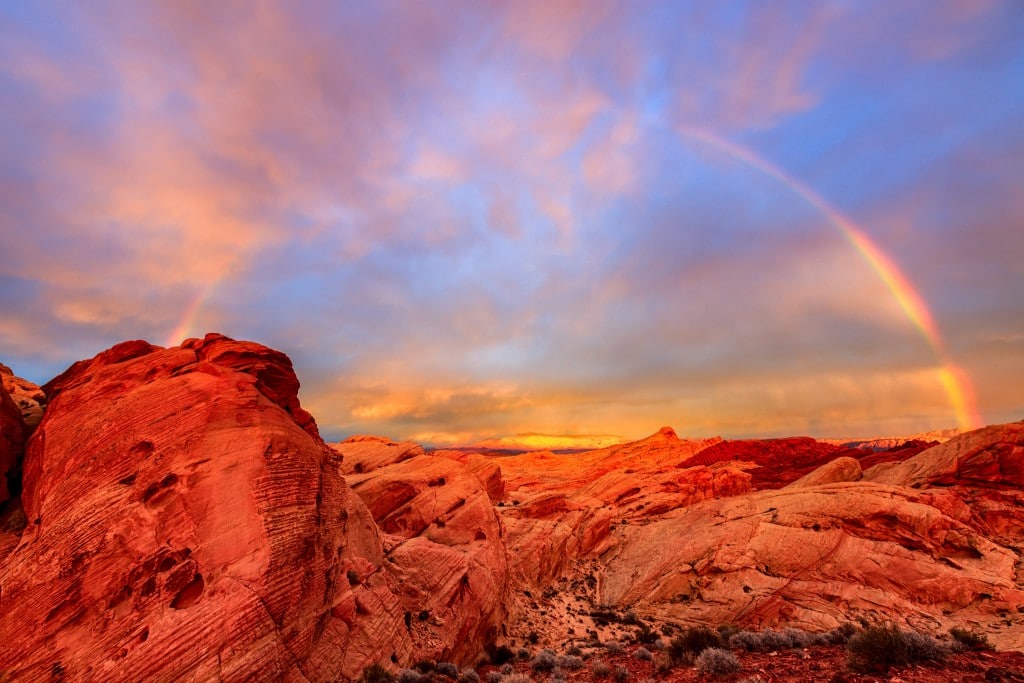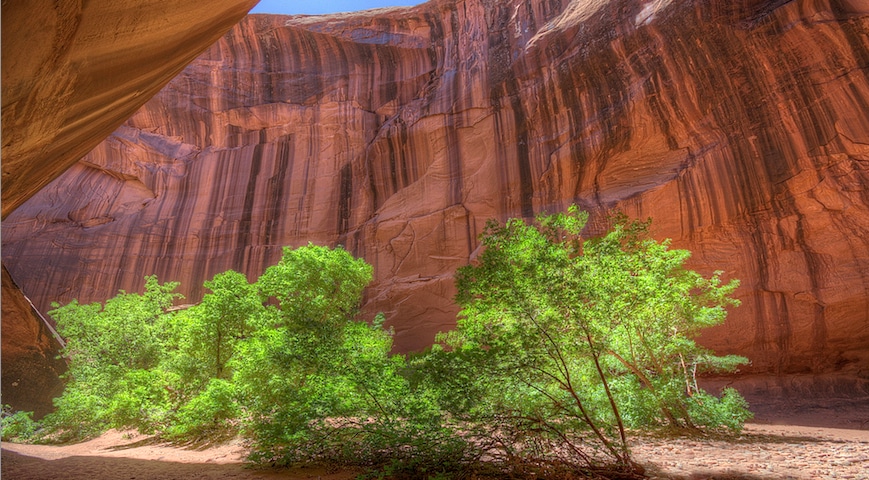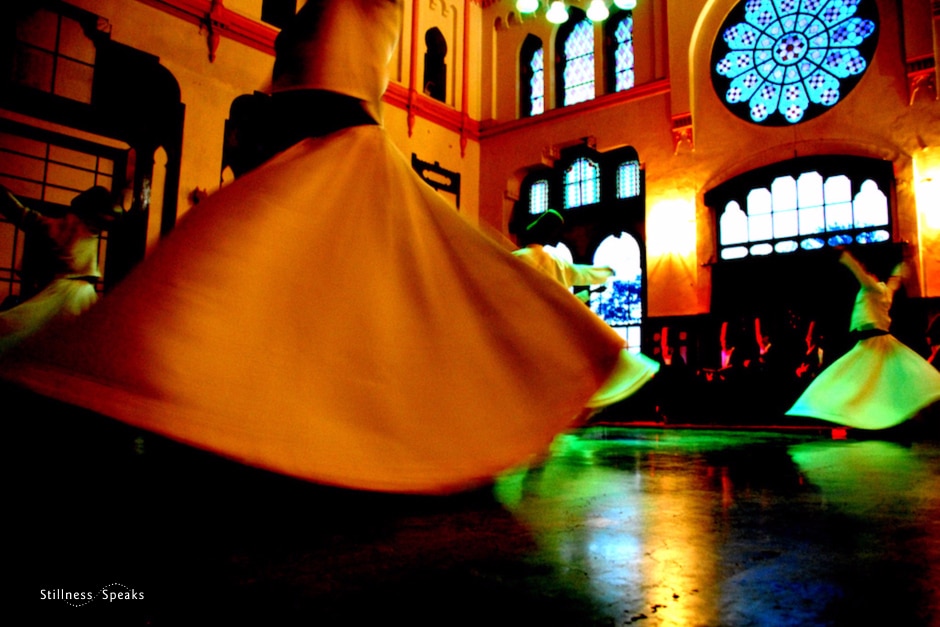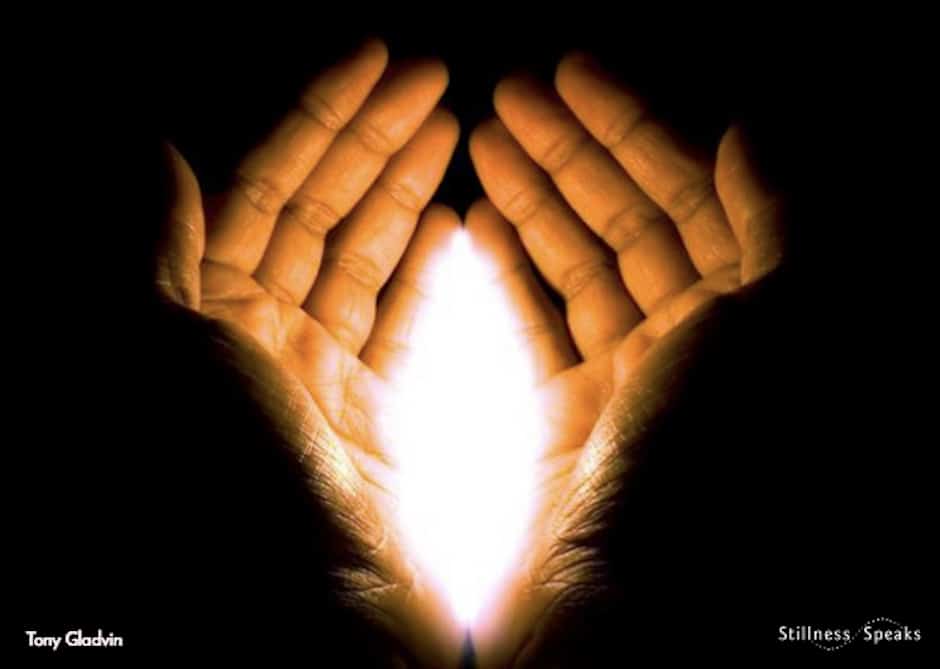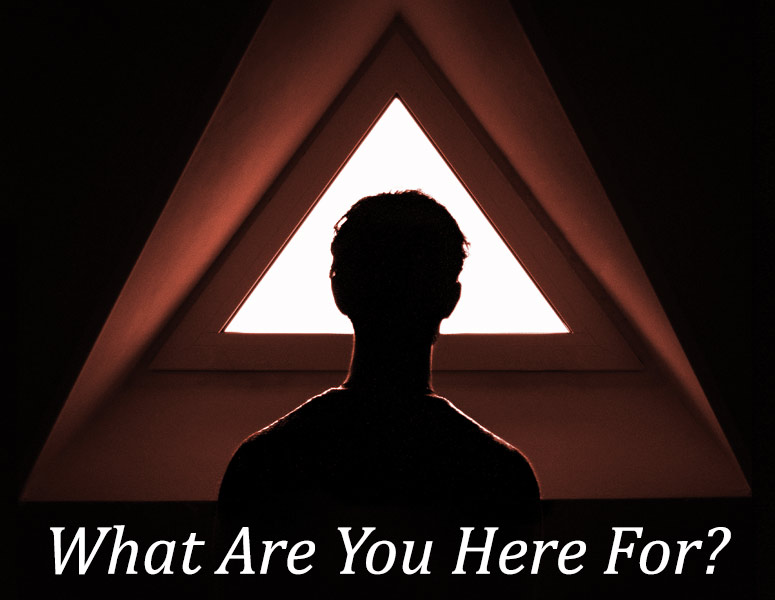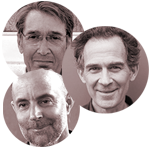In the West the sun was setting in a sea of shimmering golden clouds. The whole world seemed to be illumined by this vivid gold, was transformed by it. I had to cross the chowraha [circus] to get to the baker’s shop. Before entering, I stopped and turned and saw that right across the chowraha was a magnificent rainbow. So clear, so vivid and bright, against the golden sky; and I must have walked right under it. I stood for a while, enchanted.
There is a Russian saying that when one walks under a rainbow it means that if one has a wish or a desire it will be fulfilled. What an omen! My Master told me that my troubles are passing away. I don’t think that I ever was so happy in my life… with this special happiness never experienced before.
~Irina Tweedie
Reading Irina Tweedie’s spiritual autobiography is to be transported to India and experience directly the beauty and overwhelming magnificence of existing in a subcontinental wonderland. Aryanagar, the district where Irina was to live for two years regularly visiting a Sufi Master, enters into our consciousness as a place where the magic and the mystery of the Unknown are revealed. Her diary entries, written between October 1961 and December 1966 and encompassing her time spent in Aryanagar, London and then finally the Himalayas, take the reader on our own spiritual odyssey. Indeed, the overall effect is to taste the very living presence of her Master and his enduring wisdom for ourselves.
With unashamed honesty, Irina Tweedie records her thoughts and emotions as she embarks on her path of self discovery. Her Naqshbandi Sufi Master, Bhai Sahib (which in Hindi means Elder Brother) is an enigmatic character – cryptic, compassionate, aloof. Not given to long and verbose discourses on the nature of Reality, Irina is, nevertheless, moved by his presence. In her first formal meeting with him, Bhai Sahib asks her, ‘Why did you come to me?’ Irina’s words come spilling out:
‘I want God,’ I heard myself saying, ‘But not the Christian idea of an anthropomorphic deity. I want the Rootless Root, the Causeless Cause of the Upanishads.’
‘Nothing less than that?’ He lifted an eyebrow…
By the time we reach the twentieth century in the West, the belief in an immanent Reality for most people was on shaky ground. Unlike the revival in the East of the universal Mother immanent in all creation, the Post Modernist world had deconstructed all philosophical and religious belief into meaningless abstractions: ‘God is dead,’ Friedrich Nietzsche (1844-1900) was famously to declare. Nevertheless, in a climate where dogma and ideological ignorance were crumbling, it gave rise to new possibilities. The pioneering spirit of women like Mirra Alfassa (1878-1973) enabled more and more women to search independently for their own salvation, to find the Truth for themselves without domestic restraints. Irina Tweedie’s own search for spiritual fulfilment is yet another example of an independent Western woman taking a stand against what society expected of her.
Prior to visiting India, Irina speaks very little of her past. Born in 1907 in Russia, she was educated in Vienna and Paris. She then moved to England where she was happily married to a naval officer. His death in 1954 caused a grief of such profundity that she sought solace in religion and philosophy, turning eventually to the Theosophical Society. But it failed to inspire. An intense longing for freedom still prevailed and yet nothing would suffice. She then felt compelled to travel to India.
Continuing to Bhai Sahib her reasons for coming, she tells him of the theosophical belief that not even a guru is necessary for liberation, salvation being achievable through our own independent efforts:
‘Not even in a hundred years!’ he laughed outright. ‘It cannot be done without a Teacher!’
I told him that I did not know what Sufism was.
‘Sufism is a way of life. It is neither a religion or a philosophy. There are Hindu Sufis, Muslim Sufis, Christian Sufis. My Revered Guru Maharaj was a Muslim.’ He said it very softly, with a tender expression, his eyes dreamy and veiled. And then I noticed something which in my excitement and eagerness I had not noticed before; there was a feeling of great peace in the room. He himself was full of peace. He radiated it; it was all around us and it seemed eternal. As if this special peace always was and always would be, forever…
Immediately, Bhai Sahib instructs her to keep a diary of her experiences. The Daughter of Fire: A Woman’s Experience of Liberation through the Teachings of a Sufi Master meticulously records Irina’s day-to-day existence (which was later abridged to a much shorter version, The Chasm of Fire and published first). It charts her meetings and conversations with Bhai Sahib, as well as her attitudes and frustrations, her insights and dreams.
At first, her entries speak of the sheer physical endurance of Indian life, which becomes an almost insurmountable obstacle: the smells and the noise and the chaos in temperatures well over a hundred degrees. Nevertheless, provoked by her feisty and often quarrelsome character, Bhai Sahib is forced to break her attachment to the senses and her overriding sense of ‘poor me’. Irina is regularly made to sit outside his house, often in the blinding dust or pouring rain, whilst welcoming other devotees into his presence. He also demands that she hands over to him all of her income as a test of her dependence on money. Her protestations are loud but the Master knows it is for her own good:
‘The world is for us as we create it: if you say there is a bhut [ghost] in the tree, then there will be a bhut for you. This is all manas [mind]. But what is manas? Nothing. Manas is maya [illusion]. You want everything but are not prepared to make sacrifices, to pay the price…
‘People are not prepared to give anything up. If you want to go anywhere you will have to take the train or the plane, you are expected to pay the fare, is it not so? Be always a friend of the Almighty and you will never die. Prayer should be done always, even in ordinary prayer; but of course the only real prayer is merging, oneness with God.
Her heart responds to the essence of his words but her mind is still sloshing with anxiety and confusion. Her desire for permanent release provokes a tireless demand for her Master’s assistance:
‘Oh please help me! I am so confused!’
‘Why should I?’ He looked straight at me. ‘If I begin to help, you will ask again and again for help: how will you cross the stream? You must do it yourself, I will not help. If I do, you will get used to it and will never be able to do without my help. We all have to cross the stream alone. Don’t you realize that this is the way? I am telling you, showing you the way. THE ONLY WAY. Why don’t you realize that you are nothing? It means complete surrender. It takes time. It is not done in one day. It takes time to surrender.’
Bhai Sahib goes on to tell her that his method is the Way of the Silent Sufi. Always in silence and dependent on the maturity of the devotee, practice [dzikr] can either be the path of contemplative meditation [dhyana] in the mind (self-enquiry) or the path of complete renunciation [tyaga] in the heart (surrender). Although both paths ultimately lead to the same goal, the Teacher places greater emphasis on surrender:
‘It is like love; it cannot be hidden. If I don’t speak to you for days, you just sit. If I speak, you speak and never, never must you complain… This is the door, the only door to the King of the Heart. What is surrender of the heart? You people do not even imagine. Not only Western people, I mean Indians too… Learn to be nothing, this is the only way.’
And it is only through the heart chakra where true surrender can take place and the individual can fall in love with God. Nevertheless, he continues to taunt her:
To say, ‘I love you’, is easy but to realize it is difficult. Here is hidden the mystery of the Realization of God or Truth. Because you have to realize one fact: ‘You are in my heart, you are everything, I am nothing.’ If you begin to realize that, then you really love, and your own self diminishes, the external things begin to lose all importance. The self, and everything else, remains with the Beloved from then on, and the Beloved remains with you permanently when there is no self anymore.’
Despite these wise words, her diary entries reveal the personal torment she repeatedly endures. Her antagonisms and resentments are seething inside her, with little outlet for release. At night, she sleeps badly. In the darkness she can find no peace. Her body starts to shake violently, her skin is weeping sweat. Her mind is wrestling with visions of creatures and demons:
Without the slightest indication that it may be coming, I was flooded with a powerful sexual desire. It was just the desire, for no object in particular, just the desire, per se, uncontrollable, a kind of wild cosmic force… I sat there helpless, shaking with fear… Good heavens, what was happening? Tried to listen, to feel from where this vibration came, where it was exactly.
Then I knew; it was at the base of the spine, just above the anus. I could feel it there distinctly. It must be the muladhara chakra [psychic centre at the base of the spine]. I went ice-cold with terror…This was the coup de grace! I thought; he has activated the chakra at the base of the spine and left the kundalini energy there to… to what?
The most terrifying night of my life began. Never, not even in its young days had this body known anything even faintly comparable, or similar to this! This was not just desire; it was madness in its lowest, animal form; a paroxysm of sex-craving. A wild howling of everything female in me, for a male. The whole body was SEX ONLY; every cell, every particle, was shouting for it; even the skin, the hands, the nails, every atom…
Waves of wild goose-flesh ran over my whole body making all the hair stand stiff, as if filled with electricity. The sensation was painful, but the inexplicable thing was that the idea of intercourse did not even occur to me… The body was shaking, I was biting the pillow so as not to howl like wild animal. I was beside myself; the craziest, the maddest thing one could imagine, so sudden, so violent.
And she continues:
The body seemed to break under this force; all I could do was to hold it stiff, still and completely stretched out. I felt the over-stretched muscles full of pain as in a kind of cramp. I was rigid, I could not move. The mind was absolutely void, emptied of its content. There was no imagery; only an uncontrollable fear, primitive, animal fear and it went on for hours. I was shaking like a leaf… a mute, trembling jelly carried away by forces completely beyond any human control. A fire was burning inside my bowels and the sensation of heat increased and decreased in waves. I could no nothing. I was in complete psychological turmoil.
I don’t know how long it lasted, don’t know if I had slept out of sheer exhaustion or if I fainted…
The whole body was shaking and trembling in the morning. The cup of tea tasted bitter. Felt like vomiting.
But Bhai Sahib reassures her that this is all perfectly natural – it is the awakening of the kundalini energy in the base of her spine, it is the initiation of the soul’s longing for union with God. And unlike men, the Teacher continues, women are already well attuned to this mystical relationship:
Women, because they are nearer to Prakriti, are fertilized by the Divine Energy which they retain in their charkas and, because of this, very few practices are needed. Women are taken up through the Path of Love, for love is feminine mystery. Woman is the cup waiting to be filled, offering herself up in her longing which is her very being.
Through the ensuing days and months, Irina is tossed upon the tidal waves of ecstasy and pain; for every drop of understanding, there is a backwash of unmitigated ignorance. But gradually, the path of love begins to arise within her, the feminine mystery starts to overflow. India, in all her kaleidoscopic splendour, blossoms in front of her eyes; astonishing beauty is everywhere. And now Bhai Sahib also stands before her – Beloved Teacher and guide. Her gratitude is overwhelming; she offers herself up completely and drowns in a sea of unfathomable bliss:
Deepest peace. And I nearly fall down when I salute him lately. And the feeling of nothingness before him represents such happiness. He will be resting, his eyes closed or open; I sit, bent in two (a comfortable position for me in is presence) under the blow from the two fans; he and I alone somewhere, where nothing is but peace.
Lately it becomes increasing lovely. Deep happiness welling from within. From the deepest depth… Also at home, when I think of him, it comes over me… Soft, gentle. A bliss of non-being; not existing at all. It is difficult to believe, unless one has experienced it, that it is so glorious ‘not to be’.
The feeling of nothingness is taking over. All the humiliations and agonies of the past are leading to an unshakeable experience of the Self:
Walking to his place amongst the busy morning traffic, the noise of children going to school, cows wandering aimlessly, rickshaws driving at greatest speed, dogs fighting and the sky covered with white clouds, I reflected that the feeling of Nothingness is not only now in his presence. It stays with me… I feel like that before God, before life; it seems slowly to have become my very being.
Irina would treasure this experience for the rest of her life. Indeed, returning to London years later and embarking on giving lectures at the Theosophical Society on Sufism, she would often become carried away with the memory of her beloved teacher. Having taken a vow never to speak of anything other than her experience, her talks essentially became the records of a living tradition, imparted to all those eager to hear.
One day in the reading room of the British Library, Irina chanced upon a book elucidating the metaphysics of Rumi, by Khalifa Abdul Hakim, a Pakistani scholar. Reading it, she realized that what Bhai Sahib and Rumi were saying were identical. She immediately went home and made two copies – one by hand and the other typed:
… there is only one way of rising from the lower to the higher stage and that is by assimilation of the lower into the higher… [Rumi] believed that necessity is not only the mother of invention, it is the mother of creation as well. Even God would not have created the heaven and earth if He had not been urged by an irresistible inner necessity… For Rumi… life is nothing but a product of the will to live, and ever dissatisfied with the present equipment, life creates new desires, to fulfil which new organs come into existence.
Irina retired from teaching publicly in 1992 but continued giving talks in her home in London until her death in 1999: a photographic portrait of her taken around this time shows a striking-looking woman, with vivid blues gazing peacefully into the distance. Speaking about the way of surrender to a student one day, she says:
Here again, the terrible paradox. Complete surrender, complete nothingness, ‘yes’ to everything. This is the greatest power. I find this path is especially difficult for men, especially for the Western man because of the education, you know, the competition: ‘I am better than thou’ in sport, in everything. For women, somehow it is easier. Guruji explains one place in the book, how a woman can reach Reality just by being a woman. So I’m very glad, and I said, ‘Oh, really, wonderful!’
It’s not like that. It is just as difficult for everybody. To men, I give many practices, women need only one practice: the detachment from worldly things. Because we by our very nature are attached to comfort, to children; because a woman has to bear children, she needs security. Women are attached to security. If a woman is prepared to give up security… because spiritual life is utmost insecurity, no-man’s land, it’s like walking on water, walking on air, you have nothing under your feet. It’s a chasm of fire.
Actually, the title, Chasm of Fire is from Gregory of Nisa, the Christian mystic, a contemporary of St Augustine. He said, ‘The path of love is like a bridge of hair across the chasm of fire.’ Of hair, you know. You walk on it; it falls, you fall into the fire… very insecure indeed.
Irina’s final diary entries are on solitary retreat in 1966 in the Himalayas, where she is at the end of her journey. Three months have passed since Bhai Sahib left his physical body, after a series of heart attacks, and she now reflects on their relationship and the wisdom he has transferred. Who would have thought that a widow in her fifties could have endured so much suffering in the search for the ultimate Truth? But through surrendering to the Path of Love, everything has been revealed; through the grace of her Master Bai Sahib’s compassion, lover and Beloved have merged into One:
The sunrise, the sunset, the garden, the people, the whole daily life seems outwardly the same. But the values have changed. The meaning underlying it all is not the same as before. Something which seemed intangible, unattainable, slowly, very slowly becomes a permanent reality. There is nothing but Him. At the beginning it was sporadic; later of shorter or longer duration, when I was acutely conscious of it. But now… The infinite, endless Him… Nothing else is there. And all the beauty of nature which surrounds me is as if only on the edge of my consciousness. Deep within I am resting in the peace of His Heart. The body feels so light at times. As if it were made of the pure, thin air of the snow peaks. This constant vision of the One is deepening and increasing in the mind, giving eternal peace…
Above extract is from Women of Wisdom: Journey of the Sacred Feminine through the Ages by Paula Marvelly, which can be purchased by clicking here.
Click here to purchase Daughter of Fire by Irina Tweedie.
Post Image: Rainbow over Rainbow Vista, by Srini Sundarrajan, CC BY 2.0.
Featured Image: Attribution pending.
